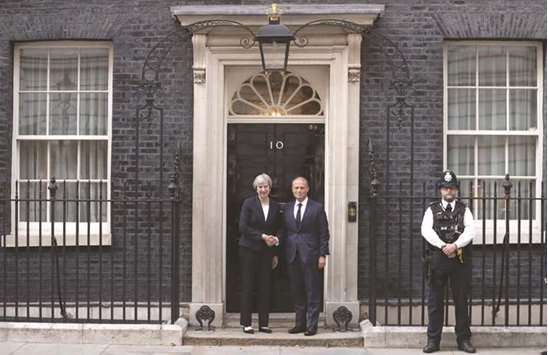Theresa May has insisted the only alternative to her Chequers plan is crashing out of the EU with no deal, prompting her critics on the right of the Conservative party to say she risks a “car crash” if she sticks to her policy.
The prime minister told the BBC yesterday she was confident of getting a deal based on Chequers, whereby the UK would agree to sign up to a “common rulebook” for food and goods, which is deeply unpopular with hard Brexiters.
May said she would then put the anticipated exit agreement to parliament for MPs to endorse, probably in November, and insisted there would be no alternative other than ‘no deal’.
Asked by Nick Robinson on BBC Radio 4’s Today programme whether she was saying “my deal or no deal”, May said: “I believe we will get a good deal. We will bring that back from the EU negotiations and put that to parliament. I think that the alternative to that will be not having a deal.”
Tory MPs in the hard Brexit European Research Group (ERG) were quick to voice their objections. Steve Baker, who resigned as a junior Brexit minister over Chequers, said he agreed with a column by Boris Johnson in the Daily Telegraph and the UK should instead aim for a Canada-style free trade agreement.
Baker began by quoting Johnson, saying “if the Brexit negotiations continue on this path they will end, I am afraid, in a spectacular political car crash,” and he went on: “He’s right. The future for the UK alongside the EU must be based on an advanced FTA (free-trade agreement), plus a range of agreements.”
Jacob Rees-Mogg, the ERG chairman, backed Baker. He told LBC radio May was wrong to argue the only options available to parliament this autumn would be accepting Chequers or leaving without a deal.
“The prime minister’s argument on the radio yesterday morning was that it was either her plan or WTO terms, in which case WTO terms would be much better,” he said.
“The only reason we have got the Chequers plan is because she didn’t put forward a better one. It’s not this simple either/or case.”
But when May was asked what would happen if parliament rejected the agreement she expects to secure with Brussels, she said: “Do you really think the European Union is going to give a better deal at that point?”
The prime minister will visit Salzburg tomorrow and Thursday to attend an informal EU council of leaders, where she will canvass support for her Chequers plan over dinner on the first night of the summit. It will be a critical test of the credibility of the proposals with EU leaders, a week-and-a-half before the Conservative conference.
May also dismissed alternative plans for the Irish border, including the one put forward last week by the ERG.
“What many of these other plans are based on is moving the border. You don’t solve the issue of no hard border by having a hard border 20km inside Northern Ireland, or 20km inside Ireland. It is still a hard border,” the prime minister said.
“What we’ve done is listen to the people of Northern Ireland … They don’t want a hard border between Northern Ireland and Ireland. The only proposal that has been put forward that delivers on them not having that hard border, and ensures that we don’t carve up the United Kingdom, is the Chequers plan.”
Johnson had written in his Daily Telegraph column that Brexit would be “a total write-off” unless May ripped up her plans for the Irish border. He said the backstop, which would keep Northern Ireland in the customs union and single market if no other agreement could be reached, was “being used to coerce the UK into becoming a vassal state of Brussels”.
But No 10 delivered a sharp rebuke to Johnson. “I think it is worth pointing out that Boris Johnson was a member of the Cabinet which agreed to the December joint report, including the backstop. At the time he congratulated the prime minister for her determination in securing the deal,” May’s official spokesman said. May had earlier told the BBC the options put forward by the EU for Brexit were unacceptable.
“The European Union had basically put two offers on the table. Either the UK stays in the single market and the customs union – effectively in the EU – that would have betrayed the vote of the British people,” she said. “Or, on the other side, a basic free trade agreement but carving Northern Ireland out and effectively keeping Northern Ireland in the European Union and Great Britain out. That would have broken up the United Kingdom, or could have broken up the UK. Both of those were unacceptable to the UK.”

Prime Minister Theresa May greets Malta’s Prime Minister Joseph Muscat outside 10 Downing Street in central London yesterday ahead of their meeting.
